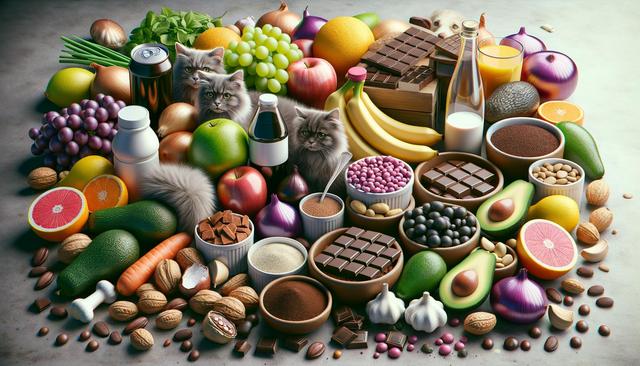Common Foods That Can Harm Your Pets
Discover foods your pets should never eat to ensure their health and safety. From chocolate to toxic fruits, learn about common foods that can harm your pets and keep them safe at home

Chocolate and Caffeine: Hidden Dangers in Sweet Treats
Chocolate is a well-known toxic food for pets, particularly dogs and cats. It contains compounds like theobromine and caffeine, which belong to a class of stimulants known as methylxanthines. These substances can cause a wide range of symptoms in pets, from mild restlessness to severe complications like seizures or even death. Dark chocolate and unsweetened baking chocolate contain the highest levels of theobromine, making them especially harmful. In addition to chocolate, caffeinated beverages such as coffee and tea should also be kept out of reach. Even small amounts of caffeine can lead to elevated heart rate, hyperactivity, and tremors in pets. Owners should be cautious not to leave chocolate desserts or drinks unattended, as curious pets may be tempted to sneak a bite or sip.
Grapes and Raisins: A Surprising Toxicity
Many pet owners are unaware that grapes and raisins can be highly toxic to dogs and possibly to cats as well. Even small quantities of these fruits have been associated with acute kidney failure in dogs. The exact toxic substance is still unknown, but the effects are well-documented. Symptoms of grape or raisin poisoning can include vomiting, diarrhea, lethargy, and loss of appetite within hours of ingestion. In severe cases, it can lead to complete renal failure, which can be life-threatening. Because of the unpredictability of the toxicity level, it’s safest to completely avoid giving pets any foods containing grapes or raisins, including baked goods like muffins or cookies. If ingestion is suspected, immediate veterinary attention is crucial.
Onions and Garlic: Harmful Alliums
Onions, garlic, leeks, and chives all belong to the allium family and are harmful to pets. These ingredients, whether raw, cooked, or powdered, can damage red blood cells in both dogs and cats, leading to a condition called hemolytic anemia. The effects may not be immediately visible, but symptoms such as weakness, vomiting, and difficulty breathing can develop over time. Onion and garlic powders, often found in processed foods, sauces, or seasoning mixes, can be especially dangerous due to their concentrated form. Common household foods that may contain these ingredients include:
- Leftover pizza or pasta with garlic sauce
- Meatloaf or burgers seasoned with onion powder
- Soups and stews with chopped onions
Keeping these items—and any dish seasoned with alliums—away from your pets is an important step in protecting their health.
Alcohol and Raw Dough: Unexpected Household Hazards
Alcoholic beverages and foods that contain alcohol pose a serious risk to pets. Even small amounts of alcohol can cause intoxication in animals, leading to vomiting, disorientation, difficulty breathing, and even coma. Beyond drinks, items like rum-soaked cakes or alcohol-based sauces should not be shared with pets. Another lesser-known hazard is raw yeast dough. When ingested, the dough can expand in the pet’s stomach, causing bloating and discomfort. Additionally, the fermentation process produces alcohol, which can further endanger the pet. Symptoms of raw dough ingestion may include:
- Abdominal swelling
- Unproductive vomiting
- Lethargy or depression
To minimize risk, raw dough should be kept well out of reach during baking, and alcoholic beverages should never be left unattended around pets.
Xylitol and Other Sugar Substitutes: Dangerous Sweeteners
Xylitol is a sugar substitute found in many sugar-free gums, candies, baked goods, and even some peanut butters. While it is safe for human consumption, it can be extremely toxic to dogs. Ingesting xylitol can cause a rapid release of insulin, leading to a sharp drop in blood sugar (hypoglycemia). Symptoms may appear within minutes and include weakness, loss of coordination, vomiting, and seizures. In some cases, xylitol ingestion can also lead to liver failure. Pet owners should always check ingredient labels and avoid giving dogs any human products that might contain artificial sweeteners. Other sweeteners such as erythritol and stevia are considered less harmful, but caution is still advised. Common products that may contain xylitol include:
- Sugar-free gum and mints
- Low-calorie baked goods
- Oral care products like toothpaste and mouthwash
Ensuring these items are stored securely can go a long way in preventing accidental poisoning.
Conclusion: Prioritizing Pet Health Through Safe Feeding Practices
Understanding which foods are dangerous for pets is a key part of responsible pet ownership. While it may be tempting to share table scraps or treats, some common human foods can have serious consequences for cats and dogs. From chocolate and caffeine to grapes, onions, and sugar substitutes, these substances should be kept far from curious paws. Being proactive about reading labels, securing food items, and educating all family members can prevent accidents and keep pets healthy. When in doubt, it’s always safer to stick to pet-specific treats and consult a veterinarian before introducing new foods into your animal’s diet.